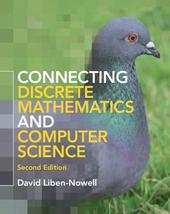
|
Connecting Discrete Mathematics and Computer Science
Hardback
Main Details
| Title |
Connecting Discrete Mathematics and Computer Science
|
| Authors and Contributors |
By (author) David Liben-Nowell
|
| Physical Properties |
| Format:Hardback | | Pages:690 | | Dimensions(mm): Height 260,Width 202 |
|
| Category/Genre | Mathematical theory of computation |
|---|
| ISBN/Barcode |
9781009150491
|
| Classifications | Dewey:004.0151 |
|---|
| Audience | |
|---|
| Edition |
2nd Revised edition
|
| Illustrations |
Worked examples or Exercises
|
|
Publishing Details |
| Publisher |
Cambridge University Press
|
| Imprint |
Cambridge University Press
|
| Publication Date |
4 August 2022 |
| Publication Country |
United Kingdom
|
Description
Computer science majors taking a non-programming-based course like discrete mathematics might ask 'Why do I need to learn this?' Written with these students in mind, this text introduces the mathematical foundations of computer science by providing a comprehensive treatment of standard technical topics while simultaneously illustrating some of the broad-ranging applications of that material throughout the field. Chapters on core topics from discrete structures - like logic, proofs, number theory, counting, probability, graphs - are augmented with around 60 'computer science connections' pages introducing their applications: for example, game trees (logic), triangulation of scenes in computer graphics (induction), the Enigma machine (counting), algorithmic bias (relations), differential privacy (probability), and paired kidney transplants (graphs). Pedagogical features include 'Why You Might Care' sections, quick-reference chapter guides and key terms and results summaries, problem-solving and writing tips, 'Taking it Further' asides with more technical details, and around 1700 exercises, 435 worked examples, and 480 figures.
Author Biography
David Liben-Nowell is Professor of Computer Science at Carleton College, and earned degrees from Cornell, Cambridge, and MIT. His research focuses on computational social science, especially social networks. He teaches broadly, emphasizing introductory and theoretical computer science, and created and led a study-abroad program in England (History of Computing). He is on the ACM 202x curriculum subcommittee for what was previously called 'discrete structures', and is a member of the Liberal Arts CS (LACS) consortium. His awards and honors include NSF research funding, Kavli Fellow of the National Academy of Sciences, and Visiting By-Fellowship at Churchill College (at Cambridge). He has also published about 30+ crossword puzzles in the New York Times, Los Angeles Times, Wall Street Journal, Chronicle of Higher Education, and other outlets.
Reviews'Finally! I've spent years struggling to find a textbook that makes the topic of Discrete Structures relevant to Computer Science students, David Liben-Nowell has put forth a book that will make CS students invested in the material. He not only connects every topic to Computer Science but does so in a clear and entertaining way.' Dan Arena, Vanderbilt University 'Unlike most discrete math texts, here the computer science content and connections are woven extensively throughout, with "forward pointers" that can excite students about numerous computer science areas they will encounter in their future studies. In addition, the book is written TO students, not FOR faculty. It will be a joy to teach with!' Valerie Barr, Mount Holyoke College 'By foregrounding the connections between the fields, this outstanding textbook makes a compelling case for why computer science students should embrace the study of discrete mathematics. This is an approachable yet rigorous book, written with wit and verve, that I look forward to teaching from!' Raghuram Ramanujan, Davidson College 'David Liben-Nowell's Connecting Discrete Mathematics and Computer Science provides students with a beautifully motivated, clearly written, and accessible exploration of the mathematical foundations of computer science. The "Computer Science Connections" sections provide compelling applications of the mathematical content and the frequent "Taking in further" notes provide extra richness that add to the joy of the experience. This is a discrete math book that truly keeps the reader engaged!' Ran Libeskind-Hadas, Founding Chair of Integrated Sciences, Claremont McKenna College 'An inspired approach to the introductory discrete math course, illuminating the aesthetic appeal of the subject together with the profound and inextricable links that connect it to the core ideas of computing.' Jon Kleinberg, Cornell University
|